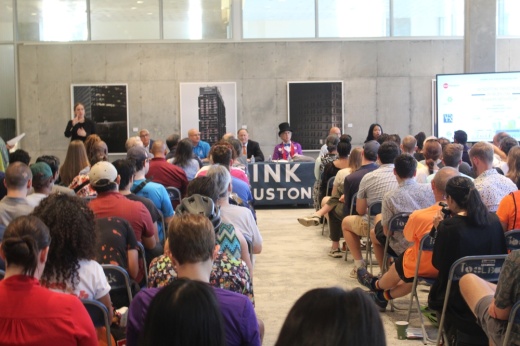Seventeen candidates filed to run for the seat in the Nov. 7 election, and whoever wins will have the task of balancing the city’s budget. Houston’s mayor is considered one of the most powerful in the U.S., experts said, with the power to single-handedly determine the agenda for Houston City Council’s weekly meetings as well as a vote on each item.
However, a ballot proposition this year could also put some power back in the hands of council members.
Two-minute impact
Turner’s successor will have roughly six months after the election before significant budget decisions must be made, Houston Controller Chris Brown said.When Turner entered office, he faced a $160 million budget hole, and he will leave with a projected surplus for the end of the 2023-24 fiscal year of roughly $420 million. In a presentation Brown gave to Houston City Council Oct. 4, he projected the city's ending fund balance for FY 2023-24 at $420.4 million. At the same meeting, the city's finance department gave its own projection for the balance: $466.2 million.
Brown said the city has balanced several budgets under Turner with one-time funding sources, including federal funding from programs such as the American Rescue Plan Act.
“The challenge with using one-time financing sources to shore up a budget gap is they are exactly that: they’re one-time,” Brown said. “So you find that you’ll have that money this year, but then you’ve got to figure out what happens the following year.”
In 2016, the estimated structural deficit was $150 million. As of 2023, Brown estimated it was around $300 million. In public statements, Turner has said the city is in a good economic position, pointing to the $420 million projected for the general fund reserve. By city policy, the reserve must never fall below 7.5% of the general fund expenditures—minus debt service and Pay-As-You-Go, or PAYGO, funding. Brown's projections would put the city at $237.3 million over that threshold at the end of FY 2023-24.
Addressing the deficit may result in layoffs, Brown said, estimating that there could need to be as many as 3,000 employees by FY 2025-26. The city of Houston did not respond to requests for comment.
However, Brown also applauded Turner’s work to lower the city’s unfunded pension liability—the difference between the estimated cost of future benefits and the assets set aside to pay for them—from about $8.2 billion to around $2 billion.
Zooming in
Following the November election and a likely runoff election in December, Houston’s next mayor will take over in January. What happens next will largely depend on which candidate wins, but past mayoral transitions can give some insight into the process, said Renee Cross, senior executive director with the University of Houston’s Hobby School of Public Affairs. Two early decisions will involve transition teams and the potential naming of new department heads.Transition teams: The next mayor will assemble teams of advisers to provide guidance on key issues. These teams will likely be put into place immediately and cover areas that voters have expressed concerns with, Cross said. The Hobby School surveyed 800 likely voters in July on their top priorities for the next mayor, she said.
- Crime was named the top priority by 83% of respondents and will likely be a top focus early on for the next mayor, who could lean on the advice of Houston Police Department Chief Troy Finner, Cross said.
- Road conditions are a top priority for 65% of respondents, but poor street conditions rose to the top priority when they were asked about problems within their own communities.
- Economic development is a top priority for 65% of respondents, tied with road conditions. Cross said the mayor has limited of economic development.
- 1992 mayoral transition: When former Mayor Bob Lanier replaced Kathy Whitmire, many people were swept out of top positions in the city, Cross said.
- 2004 mayoral transition: Historically, changes of department heads have also depended on the experience level of the incoming mayor as well as the department heads themselves, Cross said. When Bill White became mayor in 2004, his only other experience as an elected official was his time serving as party chair for the Texas Democratic Party. Someone in that situation may be more likely to rely on people who are already in place, Cross said.
What they're saying
Several representatives of local community groups spoke with Community Impact about what they view as top issues facing the city that they would like the next mayor to tackle.Noise ordinance
Stacie Fairchild, who represents groups in the Washington Avenue and Rice Military areas, said the city made progress under Turner on bolstering its noise ordinances, a process that took several years.
The city has used its stronger regulations in to hold violators accountable in several high-profile instances, and Fairchild said she was glad the issue was getting attention, but she said she felt more could be done to engage repeat violators and hold them accountable.
“We still have a loud noise issue on Washington Avenue," Fairchild said. "I would like to see the mayor collaborate with other local law enforcement agencies and expand the [memorandum of understanding] with the constables in particular to allow them to enforce the sound ordinance.”
Crime
Fairchild was among the community members to bring up crime as well. In a group statement submitted to Community Impact on behalf of several members of Meyerland Super Neighborhood No. 31, officials listed crime among the issues residents are most concerned about heading into the mayoral election, alongside road and street conditions, reliable city services—including trash pickup, water and road patches—and creating more parks with amenities.
“Particularly gang-related crime," officials wrote in the statement. "This means getting at the root causes and requires a return to neighborhood policing and openness to the idea of police substations located near areas where crime is intense.”
Planning, communication
George Frey with Super Neighborhood No. 14 is among a group of residents raising concerns about the rapid development in the Lazybrook/Timbergrove area, one of the fastest growing in Houston. As more land is bought and developed into townhomes and apartments, the future of the community will depend on the city correctly assessing traffic, flood control and utility needs with the ongoing development, he said.
Frey said it will be critical for the next mayor to appoint people to positions in the planning and public works department who prioritize transparency and communication with residents.
“We’re struggling heavily with the external communication to talk to any city employees and the inconsistencies between the departments," he said. "We’re keen to have a mayor who is going to actively encourage collaboration between the communities and city, and department to department.”
Flood control planning
Charles Goforth, president of the Brays Bayou Association, said the completion of Project Brays in Harris County will have major benefits for the community. However, he said he is looking for the next mayor to continue to lower flood risks along Brays Bayou, including with more underground strategies.
“I would like to see a greater emphasis from the next mayor on subterranean [flood control] infrastructure," Goforth said. "The surface options are extremely limited in the Brays Bayou watershed in particular, which is 99% developed.”
What's next
The new mayor will take on what is regarded as one of the most powerful mayoral seats in the U.S., Cross said. However, Houston voters will get the chance to approve or reject Proposition A on ballots this November, she said. Proposition A, if passed, would allow any member of the council to place an item on weekly agendas if it has support from at least two other members.“As far as weekly council operations and the ability to focus on some items that perhaps the mayor does not want to necessarily address at that time, it’s pretty major,” Cross said.






